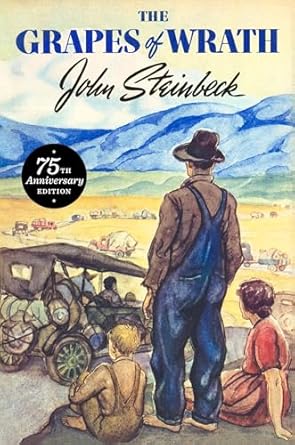The Grapes of Wrath by John Steinbeck
When The Grapes of Wrath was published in 1939, it didn’t just make waves—it caused a storm. Many schools, libraries, and even entire counties banned the book. The reasons? Harsh language, scenes with sexual undertones, and what critics saw as a harsh, almost un-American attack on capitalism and big business.
In places like Kern County, California—where the fictional Joad family ends up—the book was removed from shelves because it painted local landowners and law enforcement in a negative light. Church leaders and politicians called it obscene, vulgar, and dangerous. Some even accused Steinbeck of being a communist. And perhaps most famously, the book’s final scene—where a woman breastfeeds a starving man—shocked and outraged readers for its raw depiction of human desperation and sacrifice.
John Steinbeck knew the world he was writing about. Born in 1902 in Salinas, California, he grew up in a farming community and later worked among laborers during the Great Depression. These real-life experiences shaped his deep empathy for working-class people.
Steinbeck wasn’t afraid to speak out about injustice. His writing often gave a voice to those who were ignored or oppressed. He faced plenty of criticism for it, but he also gained enormous respect. In 1962, he won the Nobel Prize in Literature for his honest and compassionate storytelling. For Steinbeck, writing was about truth—even when it made people uncomfortable.
The novel tells the story of the Joads, a family of tenant farmers who lose everything during the Dust Bowl and head west to California in search of a better life. What they find there is not hope, but more hardship. They are met with low wages, poor living conditions, and a system that seems rigged against them at every turn.
But this isn’t just a story about one family—it’s about thousands like them. Steinbeck paints a picture of a country where the powerful few exploit the struggling many. Through characters like Tom Joad and Ma Joad, the novel shows incredible strength, resilience, and the importance of sticking together in hard times. It’s a heartbreaking, powerful reminder of what people are forced to endure—and what they’re capable of surviving.
Decades later, The Grapes of Wrath still hits home. The themes—economic inequality, injustice, climate disaster, and human migration—are just as real now as they were in the 1930s. It asks tough questions about how we treat each other, especially those with the least.
The fact that this book was banned says a lot. It challenged the status quo. It told stories people didn’t want to hear. And yet, that’s exactly why it continues to matter. Steinbeck’s novel pushes us to look at uncomfortable truths—and to care about those we might otherwise overlook. In a world still full of division and struggle, The Grapes of Wrath remains a powerful call for compassion, fairness, and justice.



About The Author
John Steinbeck was an American author best known for his powerful novels about ordinary people facing hardship. He was born on February 27, 1902, in Salinas, California, and grew up in the farming communities of the Salinas Valley—an area that greatly influenced his writing.
Steinbeck is famous for novels like The Grapes of Wrath, which tells the story of a poor family forced to leave their home during the Great Depression, and Of Mice and Men, a heartbreaking tale about two migrant workers chasing the American dream. His books often explore themes like poverty, injustice, friendship, and human dignity.
Many of his works give a voice to the struggles of the working class and show the harsh realities of life during tough economic times. He wrote in a simple, honest style that made his stories feel real and relatable.
In 1962, Steinbeck was awarded the Nobel Prize in Literature for his “realistic and imaginative writing.” He also won the Pulitzer Prize for The Grapes of Wrath in 1940.
Steinbeck passed away on December 20, 1968, but his novels remain widely read and studied for their emotional depth and social impact.

